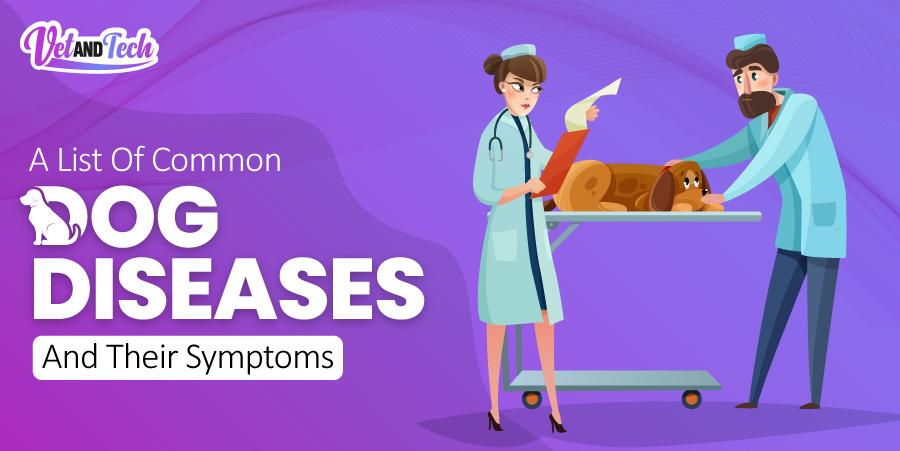A List Of Common Dog Diseases And Their Symptoms
Whether we like it or not, dogs are susceptible to several common ailments. Most of these ailments are not severe and can be treated. But some can be dangerous to your dog's health if they go undetected and untreated.
As a dog owner, it is imperative to know about common dog diseases and seek veterinary help in case you sense something is amiss. But among the many dog diseases, what are the most common ones that affect dogs?
Dog owners must be aware of these diseases and their symptoms. This kind of information is useful for detecting symptoms and treating conditions as soon as possible to avoid serious consequences.
Read this blog to learn about dog diseases requiring immediate veterinarian attention.
Common Dog Disease and Symptoms
Pet owners make every effort to keep their pets healthy. Dogs, however, are still sometimes susceptible to illnesses due to environmental factors. If a condition develops in a dog, it is best to treat it as soon as possible. To treat a disease early, pet owners must recognize the nature of the disease. If an owner notices symptoms early on, the dog can be treated to recover. However, if a condition is ignored or neglected, it can have serious consequences. For pet owners to recognize disease symptoms, they must first learn about dog diseases and their symptoms.
Below are details about common dog diseases and their symptoms:
Dental Diseases
Oral infections are the most common dog disease, and they are more common in older dogs. Tartar and gingivitis are two of the most common oral health issues. At the same time, more severe periodontal diseases, such as abscesses, are more common in older dogs in their later stages. Teeth problems must be addressed immediately to avoid pain and jaw infections.
Symptoms
Dental disease symptoms include:
• Breath that stinks
• Loose teeth
• Appetite changes
• Refusal to consume dry food
• Blood or pus discharge from the mouth
• Drooling
• High temper
• Teeth and gums that are discolored
Ear Infections
Allergies can cause recurring ear infections. The most likely allergens are in their food, like corn, wheat, soy, and more. Besides, dogs with large, pendulous ears are more prone to ear infections. Another common cause of ear discomfort in dogs is ear mites—tiny parasites that live in the ear canal and feed on wax and oils. These mites are highly contagious and especially common in puppies or dogs that have been in close contact with other animals. Your dog may have an ear infection if you notice him scratching or pawing at his ears, shaking his head, or rubbing his ear against the floor or furniture. Ear infections can become severe and painful, necessitating a visit to the veterinarian.
Symptoms
More severe symptoms may include ear canal redness.
• Crusts or scabs around the ear
• Loss of hair
• Balance issues
• Walking in circles
• Pain
• Hearing loss
Skin Infections
Constant scratching signifies something is wrong with the dog's skin. A food allergy is the most common cause of itchy skin in dogs. There are many common food allergens in dog foods, like corn, soy, and more. A low-allergen diet, such as lamb and rice, may help your dog's itchy skin. However, a visit to your veterinarian is the best course of action. Bacterial and yeast infections can cause itching in dogs and further complications, necessitating a veterinarian's attention.
Symptoms
The symptoms of skin diseases in dogs are:
• Inflammation
• Redness or discoloration
• Lesions or scabs
• Scaly patches
• Rashes
• Dry or flaky skin
• Bald patches
• Swelling or lumps
Urinary Tract Infections
UTIs (urinary tract infections) are relatively common in dogs. Take your dog to the vet if you notice any changes in his urine. Urine that stinks, for example, indicates serious issues. Urine infections must be treated as soon as possible. The veterinarian will have to perform a urine test to determine the type of infection and treat it. Urinary tract infections can have serious consequences, so they need immediate attention.
Symptoms
UTIs become evident through symptoms such as:
• Frequent urination
• Breaking house training
• Blood in the urine
• Dribbling urine
• Crying out while urinating
• Straining to urinate
• Frequently licking the genital area
Wrapping Up
To summarize, monitoring your dog's behavior and looking for changes that may indicate his discomfort is critical. While dogs are susceptible to diseases, the majority of them are treatable. Therefore, pet owners must be insightful enough to notice behavioral changes in their pets. As the proverb goes by, 'It is always better to be safe than sorry.'
If you need more information, you may explore our veterinary resources and guide on common health issues in dog breeds. Vet and Tech contain information on animal diseases that can help you learn more about them. Learn about diseases and how to protect yourself and your pets from them.
Frequently Asked Questions
What do most pets require to stay healthy?
A healthy diet, regular exercise, grooming, and regular vet visits will help keep your pet in peak condition.
What are some disease symptoms in dogs that you should never ignore?
Rapid and unexplained weight loss, personality changes, excretory problems, decreased appetite, breathing problems, and excessive licking or scratching are all symptoms of illness in your dog.
How often should you bathe your dog?
A dog with a short, smooth coat and no skin problems does not require frequent bathing. Even so, cleaning your pet at least once every two months is a good idea.







